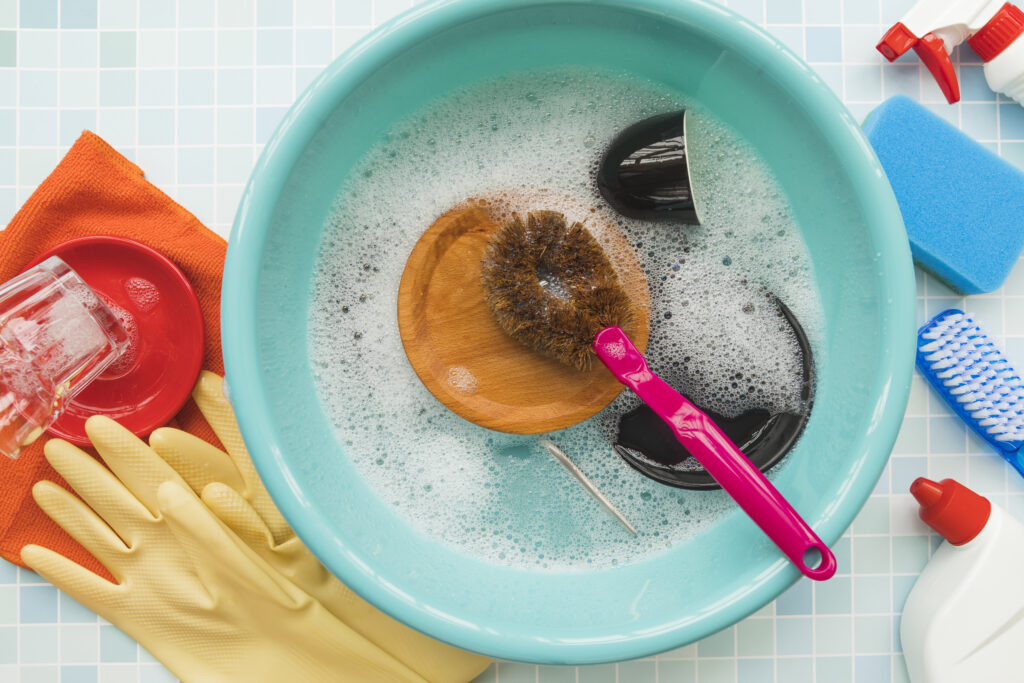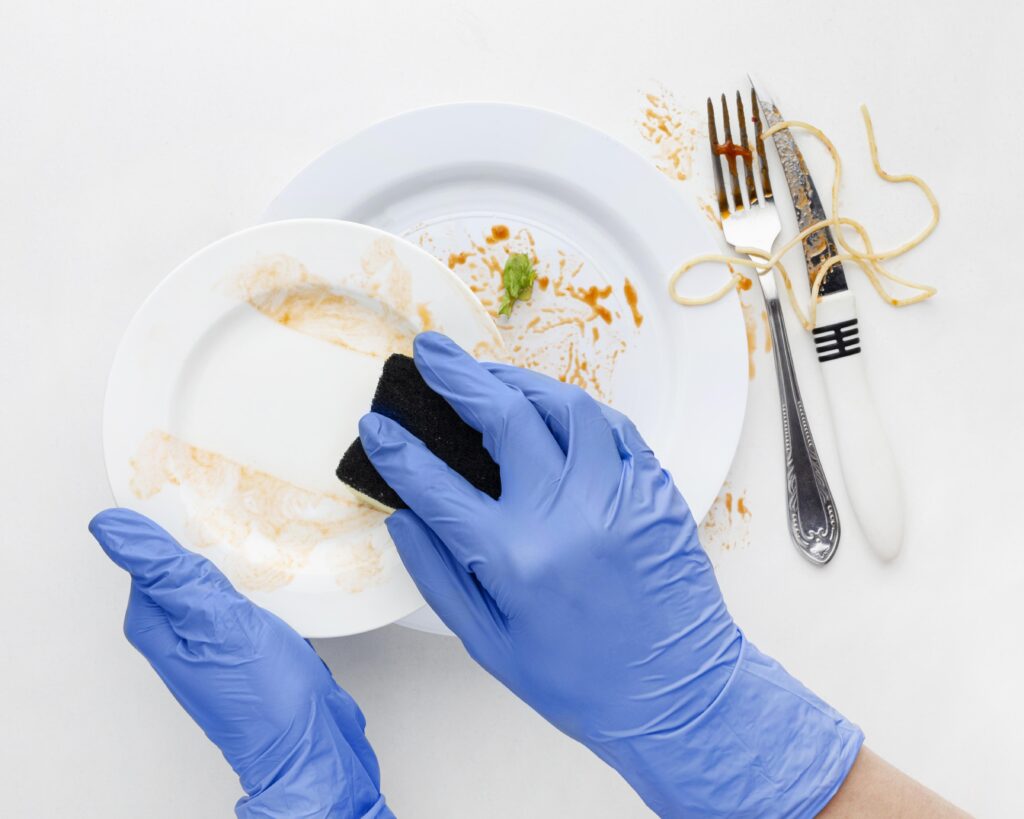
A Proper Method for cleaning dirty utensils is fundamental for keeping a solid kitchen and guaranteeing that your food is protected to eat. Notwithstanding, cleaning filthy utensils can be an overwhelming errand, particularly in the event that they have obstinate stains and grime. In this blog, we will uncover ten demonstrated hacks for successfully cleaning messy utensils, making your kitchen errands a breeze. In this way, how about we make a plunge!
Table of Contents

Significance of Clean Utensils
Before we dive into the cleaning hacks, we should comprehend the reason why it is pivotal to keep our utensils clean. Grimy utensils can become favorable places for hurtful microorganisms and microbes, which can pollute our food and lead to different sicknesses. Besides, gathered oil and grime can influence the taste and nature of the food we plan. Hence, keeping up with clean utensils is crucial for the general prosperity of our loved ones.
Hack 1: Pre-Soak in Hot Water
One of the least demanding ways of handling difficult stains on utensils is by pre-absorbing them boiling water. Essentially fill a sink or a bowl with boiling water and add a couple of drops of dishwashing fluid. Allow the utensils to drench for around 30 minutes prior to scouring them with a wipe or a brush. The boiling water relaxes the grime, making it simpler to clean.
Hack 2: Utilize Baking Soda
Baking soft drink is a flexible and strong cleaning specialist that makes all the difference for filthy utensils. Make a glue by blending baking soft drink in with water and apply it to the stained regions. Permit it to sit for a couple of moments, and afterward scour the utensils with a non-grating wipe. The baking soft drink will assist with eliminating obstinate stains and smells.
Hack 3: Lemon Power
Lemons are not just perfect for adding flavor to our dishes yet in addition for cleaning utensils. The natural acidity in lemons helps break down grease and grime. Slice a lemon down the middle and rub it on the outer layer of the utensils. For tougher stains, sprinkle some salt on the lemon before scrubbing. Rinse the utensils thoroughly afterward.
Hack 4: Vinegar Solution
White vinegar is another fantastic natural cleaner for dirty utensils. Make a solution by blending equivalent pieces of white vinegar and water. Soak the utensils in the solution for about 20 minutes, and then scrub them gently. The acetic acid in vinegar dissolves tough stains, leaving your utensils sparkling clean.
Hack 5: Boiling Water
For metal utensils, bubbling water can be a viable cleaning technique. Place the filthy utensils in a huge pot, cover them with water, and heat it to the point of boiling. Allow them to stew for a couple of moments prior to eliminating them from the intensity. Be cautious while handling hot utensils and use tongs if necessary.
Hack 6: Salt Scrub
Salt is a superb grating that can assist with scratching off obstinate grime without starting to expose your utensils. Sprinkle a few salt on the grimy utensils and utilize a soggy wipe to clean away the soil. The coarse surface of salt will help with eliminating buildup, making your utensils sparkle.
Hack 7: DIY Cleaning Paste
Create a powerful cleaning paste by mixing equal parts of baking soda and hydrogen peroxide. Apply this paste to the stains on your utensils and let it sit for a while. The combination of baking soda and hydrogen peroxide works effectively to remove even the toughest stains.
Hack 8: Use of Toothpaste
Toothpaste isn’t only for your teeth; it can likewise be utilized as a cleaning specialist for your utensils. Apply a small amount of toothpaste to a sponge or a brush and scrub the stained areas. The mild abrasives in the toothpaste will help eliminate grime, leaving your utensils clean and fresh.
Hack 9: Aluminum Foil Trick
Aluminum foil can come to the rescue when dealing with burnt-on stains. Ball up a piece of aluminum foil and use it to scrub the affected areas on your utensils. The foil’s abrasive nature, combined with some dishwashing liquid, can effectively lift off the toughest stains.
Hack 10: Dishwasher Method
If you have a dishwasher, make sure to arrange your dirty utensils properly for a thorough cleaning. Avoid overcrowding the dishwasher, as it can hinder the cleaning process. Additionally, use an effective dishwasher detergent to ensure that your utensils come out spotless and sanitized.
Conclusion – The Proper Method for Cleaning Dirty Utensils
Cleaning dirty utensils doesn’t have to be a tedious task anymore. With these ten proven hacks, you can maintain a clean and hygienic kitchen effortlessly. From using regular fixings like lemons and vinegar to evaluating baking pop and toothpaste, you have a scope of compelling choices available to you. So, bid farewell to dirty utensils and embrace a spotless kitchen!
FAQs – The Proper Method for Cleaning Dirty Utensils
- Might I at any point utilize apple juice vinegar rather than white vinegar for cleaning utensils?
- Yes, apple cider vinegar can be used as an alternative to white vinegar for cleaning utensils.
- Is it protected to utilize aluminum foil on non-stick cookware?
- It is best to avoid using aluminum foil on non-stick cookware, as it may scratch the non-stick coating.
- How often should I clean my kitchen sponges?
- Kitchen sponges should be cleaned thoroughly every week and replaced every two to four weeks.
- Could I at any point utilize these cleaning hacks on wooden utensils?
- Some of these hacks, like the baking soda paste and vinegar solution, may be used on wooden utensils, but it’s best to check the manufacturer’s instructions first.
- Should I rinse my utensils after using the cleaning paste?
- Indeed, it’s crucial for wash your utensils completely subsequent to utilizing any cleaning glue to eliminate any buildup and guarantee the glue doesn’t influence the flavor of your food.


Pingback: Step into a No. 1 Chemical-Free Paradise: Non-Toxic Floor Cleaner Unveiled - CREATIVE WEB-MANIA
Your point of view caught my eye and was very interesting. Thanks. I have a question for you.